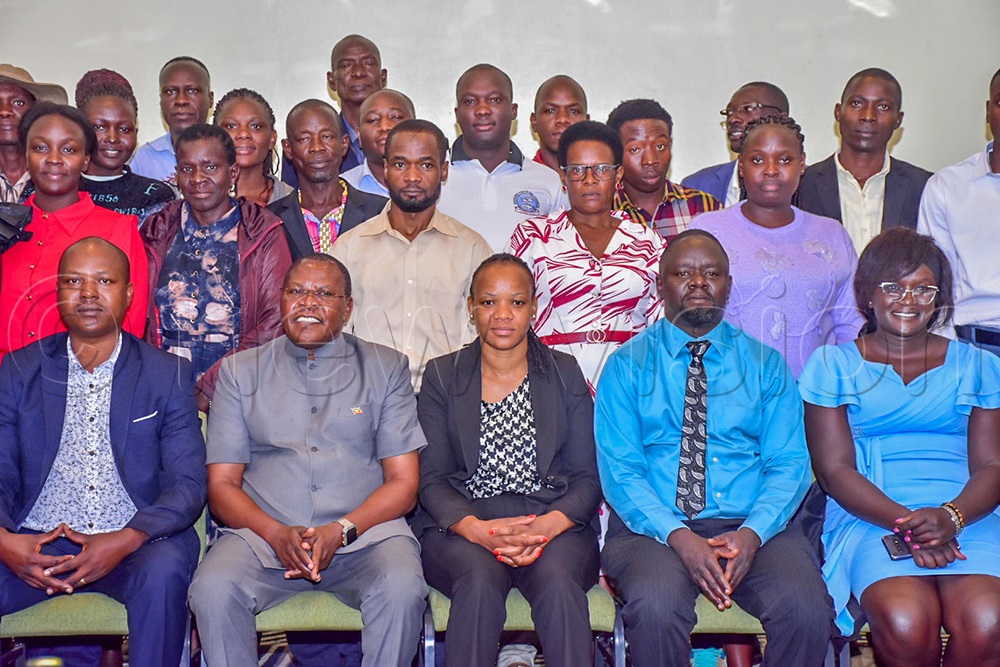Agric organisation eyes black soldier flies to reduce fish farmers' costs
According to Dr Maxwell Otim, the commissioner in charge of Entomology in the agriculture ministry, the Government will collaborate with ASARECA to promote BSF production throughout the country after it was discovered that fish feed accounts for about 70% of total production costs.
Dr Maxwell Otim, the commissioner in charge of entomology in the agriculture ministry speaking. (Photo by Sharon Nabasirye)
__________________
Scaling up mass rearing of protein-rich Black Soldier Flies (BSF) will reduce on-farm costs, New Vision Online has heard.
Therefore, the Association for Strengthening Agricultural Research in Eastern and Central Africa (ASARECA) has drawn strategic plans to scale up the mass rearing of Black Soldier Flies.
Working in collaboration with the National Agricultural Research Organisation (NARO), the Centre for Insect Research and Development (CIRD) based in Kawanda, Wakiso district and the International Centre of Insect Physiology and Ecology (ICIPE), ASARECA has started a campaign to offer practical training to fish farmers on mass rearing of BSF that serve as rich proteins to fish.
Dr Maxwell Otim, the commissioner in charge of Entomology in the ministry of Agriculture, Animal Industry and Fisheries (MAAIF) (fourth on left) in a group photo with farmers, facilitators and funders. (Photo by Sharon Nabasirye)
This is targeted to reduce on-farm production costs.
According to Dr Maxwell Otim, the commissioner in charge of Entomology in the agriculture ministry, the Government will collaborate with ASARECA to promote BSF production throughout the country after it was discovered that fish feed accounts for about 70% of total production costs in Uganda’s aquaculture industry.
He noted that this is largely due to the high price of imported protein sources like soya and silverfish, which are used as sources of protein in animal feed and fortified food products.
“Early research shows that incorporating BSF-based feed could reduce these costs by up to 10%, with potential for greater savings as adoption grows,” Otim said and asked fish farmers in Uganda to embrace the strategy.
According to him, the benefits extend beyond animal nutrition, adding that the residue, known as frass from BSF rearing, also serves as an excellent organic fertiliser for farmers, improving soil health and reducing dependence on chemical inputs.
The commissioner notes that the ministry is working to integrate BSF farming into the National Aquaculture Policy and collaborate with the Uganda National Bureau of Standards (UNBS) to ensure quality and safety.
He was on October 21, 2025, addressing lead farmers in the breeding of the BSF, on-farm formulation and production of fish feeds, and establishment of demonstration BSF production facilities for selected lead fish farmers in the districts of Mukono and Wakiso at Hilton Gardens Inn in Kamwokya, Kampala.
The training is organised under the Uganda Climate Smart Agricultural Transformation Programme, also targeting to equip extension workers and farmers with the necessary skills.
According to Otim, with continued awareness, policy support and innovation, BSF farming could soon help Ugandan farmers feed their ponds and their livelihoods more sustainably.
After the four-day training, farmers received starter kits to strengthen the capacities of the Aquaculture Innovation Platforms to scale up proven CSA TIMPS.
The training was funded under the Comprehensive Africa Agricultural Development.